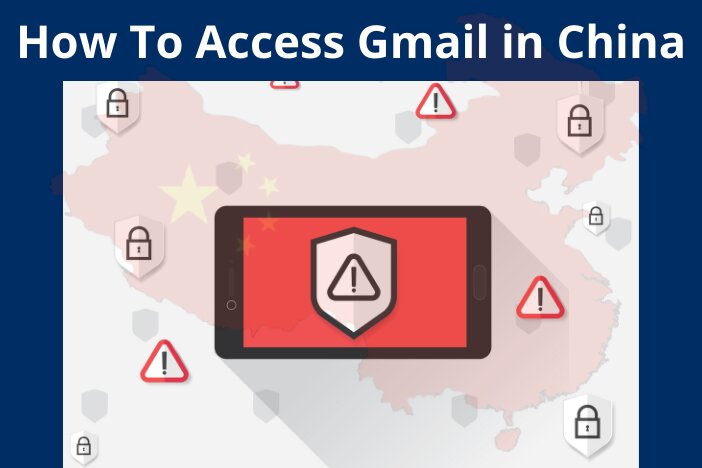You are about to head to China, but your research just showed that you can’t access Gmail in China right?…
Then that leads to starting searching and looking for ways on how to browse without any restriction and access your emails while in a communist country with lots of internets censorship.
Except you are living under the rocks or has nothing to do with traveling to China now or in the nearest future, you must have probably heard of the Great Firewall of China.
That is China’s own way of restricting access to the internet in a bid to protect what the authorities have chosen to call “state secrets”. This they do by blocking access to selected sites of which Gmail is on the list.
What Is the Great Firewall of China?
The Chinese Great Firewall is a strict censorship mechanism that prohibits Chinese internet users from accessing online platforms such as Google, Instagram, Twitter, Netflix, Wikipedia, and many others.
That’s not an official name, but it has become a popular term in China because the ruling party has built up an advanced strategy to control web activity over the last few decades.
It requires a range of access-blocking tactics, ranging from legal legislation to advanced technologies.
Simply put, the aim is to stifle the flow of knowledge for political purposes.
It all began a few years back when Chinese citizens began to have extensive access to the internet.
The government moved rapidly to get the situation under control, and the complicated structure that exists today was born.
Almost no one knows how it works, and that’s partially due to the fact that it’s always evolving.
The above makes it much more difficult to get through the limitations, which can vary widely between locations, internet service providers, and of the day today.
That being said, there seems to be one way to get through the Great Firewall: through the use of a VPN, or virtual private network.
In reality, using VPNs in China has been used since the inception of the country’s technology boom, and is very common among local tech geeks.
However, there is still a battle of wills amongst VPN providers and the authorities, and it is not unusual for smaller VPN providers to be shut down as a result.
The majority of the population in China, especially foreign nationals and tourists, use ExpressVPN and NordVPN, which appears to be a far more stable and reliable choice so far.
Most VPNs are blocked in China, and at that, most of the ones that work in many other parts of the world probably wouldn’t work there.
However, a few are trustworthy, even under the country’s tight surveillance, as we’ve verified through extensive testing. As a consequence, ExpressVPN is our top recommendation.
These leading VPNs enable you to connect to servers based outside of China, enabling you to circumvent restrictions and access restricted websites and apps.
They also safeguard your online privacy and protection by encrypting your data and protecting it from hackers, the government, and your internet service provider.
VPNs are, as you would assume, important for most of those flying to China – even if you’re traveling for business or simply want to stay linked throughout your journey, you’ll need one as well.
In reality, you’ll almost certainly need more than one it’s often a good idea to have a back-up plan!
Is Gmail Blocked in China?
Yeah, Gmail has been blocked and restricted in China since about the middle of 2014.
Gmail is far from alone when it comes to being censored in China. China started blocking a number of applications and websites in 2009, including Twitter, Facebook, and a variety of western media websites.
Google established office buildings in Beijing for a time, and it offered search engine services to mainland China.
After Google declined to censor their searches at the request of the Chinese government in early 2010, that came to an abrupt end.
They emptied their Beijing office and transferred it to Hong Kong within a few months.
In retaliation, China quickly started restricting all Google-related services. This covers nearly every Google service you can conceive of.
Google Maps, Google search, YouTube, Google Translate, and, indeed, YouTube are all unavailable in China.
…wait for it…don’t even worry about using Gmail in China.
A Selected List of Websites That the Chinese Authorities Censor and Blocks
In this list below, are a few of the websites that will not make it through the Great Firewall of China. Though not an exhaustive list, it does help…
| Google Apps (Drive, Docs, Calendar, Maps, etc.) Microsoft OneDrive Slack Google Play Hootsuite YouTube Snapchat Quora Tumblr AO3 Viber Porn websites VPN websites Politically sensitive sites WordPress.com Blogspot | DailyMotion Vimeo Twitch Periscope Pandora Spotify Soundcloud Dropbox Netflix Flickr BBC Financial Times Reuters Skype Google Hangouts | CNN TIME The New York Times The Wall Street Journal Google (text and voice) Amazon (Alexa) Wikipedia DuckDuckGo Facebook Messenger Telegram Line Signal KaKao Talk (Korean) Medium |
Just think of any other website that is run from the western world, these are the kind of sites that may not likely pass through the Great Netwall of China.
How to Access Gmail in China and Bypass Chinese Censorship of the Internet
Now it’s time to ask the billion dollars question: Will Gmail be available in China?
Before I address that question, I should point out that Gmail is restricted across mainland China, with the exception of Macau, Hong Kong, and Taiwan.
That implies that when you arrive in China and attempt to check your messages, your laptop or phone will be unable to connect to the email system.
Gmail is used by a large number of people in their everyday lives and at work, and many of them are unaware of it.
Even if they have their own email address, several organizations around the world have moved to GSuite tools (which includes Gmail).
Even if your email address is “david.michael@thebestcompany.com,” it may be hosted by Gmail and indeed blocked in China.
Obviously, this isn’t nice.
What then are your choices for accessing Gmail in China if you, like many others, rely on it for interaction?
You’ll want to be able to check your email on both your computer and your phone.
Let’s take a closer look at what’s going on and how to stop it.
In order to be able to access Gmail in China, the following options are what we at VPNJedi really recommends.
1. Using The Tor Browser
Let me clarify why I didn’t recommend using a Tor Browser to cover your internet use from the Chinese government as a possible method up front.
That’s because the country’s officials have instructed the Great Firewall to restrict Tor privacy traffic.
Tor is a volunteer-run open program that enables anyone to mask their whereabouts and internet activity from anyone watching their connection. As a result, most internet activity is anonymous.
As you would assume, anonymous behaviour doesn’t really sit well with a communist government that aims to keep its people cut off from the abundance of information available on the internet.
Although the Tor browser was initially successful in encrypting Chinese internet traffic, the people in charge of the Great Firewall have found a method to recognize and restrict Tor traffic.
That being said, the approach they use is much too nuanced to be used in this blog article.
2. Using a Proxy Server to Get Access to the Great Firewall of China
To begin, we’ll look at how to use a proxy server to mask your web activity against China’s Great Firewall.
A proxy server is a device that serves as a go-between for your computer and the web browsers you want to visit.
It reroutes the client’s internet traffic, making it accessible to the online resource you want via an indirect connection.
For example, the proxy server connects to a machine that requests information from an individual resource, such as the weather in Sydney, Australia.
The proxy server acknowledges the message, forwards it to the appropriate server, and then returns to the requesting machine the information received from of the server.
By cloaking your online queries and where all the information is collected from, this means of obtaining the data helps mask your true web activity.
By literally cloaking the operation, you can gain access to Gmail and other restricted websites in China.
Although using a proxy server to access blocked websites when behind the Great Firewall is a tried and tested process, Chinese officials seem to be much effective at spotting and blocking proxy server use.
Although some bright minds have tried to keep an up-to-date list of possible proxy servers that somehow still operate around the Great Firewall, such tools become outdated almost as soon as they are written.
As a consequence, the list is far from being trustworthy, and users’ progress is like trying your luck.
Proxy servers are also known for delaying a person’s internet connection, and because China’s internet connection is still one of the slowest in the world, a proxy server is hard to satisfy your demands – particularly when you are using Gmail to send attachments.
3. Lodge at Some Selected Western Hotels
If you plan on staying in a high-end hotel, you will be able to access Google, Facebook, and other websites that China restricts access to.
Further analysis shows that these hotels’ internet tends to be routed through a Hong Kong portal rather than through mainland China.
Now I’m not sure which hotels in China have unfiltered internet access (but hotel like Grand Hyatt Shanghai & Park Hyatt Shanghai would be a good place to turn to).
Again, you do not know if this is because of your status as a foreigner, but being able to interact with friends and family back home is a big advantage for staying visitors.
4. Consider Using Google Fi
When going overseas, Google Fi should become your go-to phone service provider. With cellular coverage in more than 100 nations as well as a very affordable flat rate of $10 per GB used, the periods of travelling overseas and being faced with a triple-digit bill are long gone.
When calling over domestic and international cellular networks, calls are paid at a flat rate of $0.20 per minute. You can use Skype and save cash on calls made through WiFi, but Google does offer a discount.
Incoming calls rarely fail to connect, and you will always get SMS and will seldom, have any problems with outgoing calls.
The obvious lack of some kind of Chinese Firewall that blocks access to most US-based sites and apps is one of the best hidden benefits of using Google Fi in China.
During your visit to any part of China, especially mainland China, you will have unrestricted access to the internet.
However, you can encounter abysmal speeds, relegating you to EDGE / 3G speeds that harken back to the dial-up era.
However, with Google Fi’s 4G connectivity, you’ll be able to get LTE coverage on all of your trips to Shenzhen.
The Google Fi provides remarkable (10 mb/s) speeds that are equivalent to the hotel’s broadband.
Best of all, you’ll be able to use Instagram, Facebook Messenger, and, most importantly, Gmail, because the internet will remain unfiltered.
We believe the unfiltered internet was a tough bargain for Google, as getting your accounts blocked while in China would clearly clash with a Google phone service.
The most significant caveat is that you’ll need a Nexus 6P, Google Pixel, or Nexus 5X to use Google Fi.
The good news is that all three phones are well-received, with the Google Pixel also outperforming the iPhone 7 in terms of tech outstanding performance.
The Nexus 5X is available for $199, which is a fantastic deal given how much money you’ll save.
Your cost should be no more than $50-60 a month if you are using moderate data (no streaming video), which is a steal for global roaming and mobile utilization
Bottom Line: A Google Fi plan is the ideal option if you’re looking for a seamless means of accessing uncensored internet while in China.
5. Using a Virtual Personal Network (VPN)
When you’re heading to China, you might assume that any VPN will provide you with internet access. However, due to the country’s strict censorship policy, several VPNs are made worthless – and sometimes even harmful.
If you’re using a normal VPN in China, you may not only have difficulty communicating, but you will also jeopardize your privacy.
The usefulness of a VPN is also determined by your position. That’s why you’ll need a stable VPN that can link you to different parts of China.
Owing to its world-class security features, ability to circumvent the Chinese government’s anti-VPN measures and scale the Great Firewall of China, and super-fast speeds, ExpressVPN and NordVPN are the best VPNs for China.
The Chinese government has implemented much more internet restrictions than normal ever since the outbreak of the coronavirus pandemic.
Accessing blocked websites is particularly difficult right now, but that’s not inevitable.
The Best VPNs to Access Gmail in China
I do know that the best VPNs to access Gmail in China is what you are here for.
Without laboring the issue, in order to be able to access Gmail in China without any hassles, the best VPNs with which to achieve that are:
1. ExpressVPN
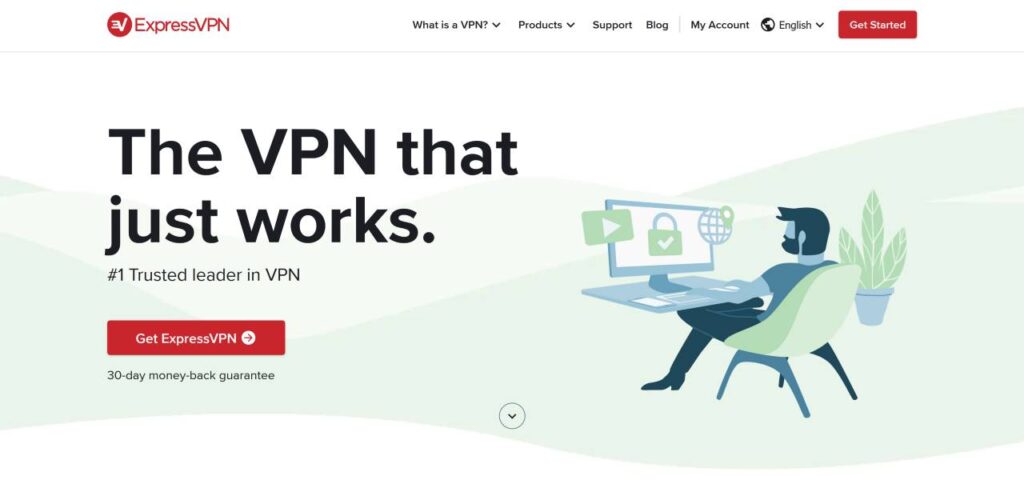
Consider using a virtual private network, or VPN, if you’re ever worried about who may be looking over your virtual shoulder.
ExpressVPN is a strong competitor in the consumer VPN market, with a large number of servers scattered around the globe, guaranteeing that one will be nearby.
It has also spent a lot of time and money developing and explaining how it runs a safe and stable company.
Although the value of its offering has changed, it is still on the pricey side for what it gives the average customer.
With ExpressVPN’s split funneling feature, you can choose which apps and services you want to encrypt.
You can use the MediaStreamer feature to access services that do not support VPNs. Netflix, Hulu, Amazon Fire TV sticks, BBC iPlayer, game consoles, and other devices are all available.
For P2P operations on all servers, you would not need a torrenting profile. Smart Location chooses the most suitable servers for you.
ExpressVPN is compatible with all computers. A single ExpressVPN subscription will protect you regardless of where you are and what devices you’re using.
You can be sure to get through China’s Great Firewall with ExpressVPN. As a result, it’s an excellent alternative to consider if you’re heading to China or other heavily censored countries.
ExpressVPN provides three different subscription plans: $12.95 every month, $59.95 every six months, and $99.95 every year. The only difference between this service and others is how lengthy you stick.
PayPal, all debit and credit cards, as well as other payment systems such as Alipay and WebMoney are approved by the company. Bitcoin can also be used to buy ExpressVPN subscriptions.
This service provides live customer assistance 24 hours a day, 7 days a week. They also provide web chat and email support to assist you in getting started.
This ensures that you really can quickly reach out to ExpressVPN’s highly technical workers for assistance no matter where you are or when you need it.
One of ExpressVPN’s promises is that it is simple to use. However, if you are disappointed, you will be reimbursed your money with no questions asked. Since you’re protected by a 30-day money-back guarantee, this is the case.
2. NordVPN
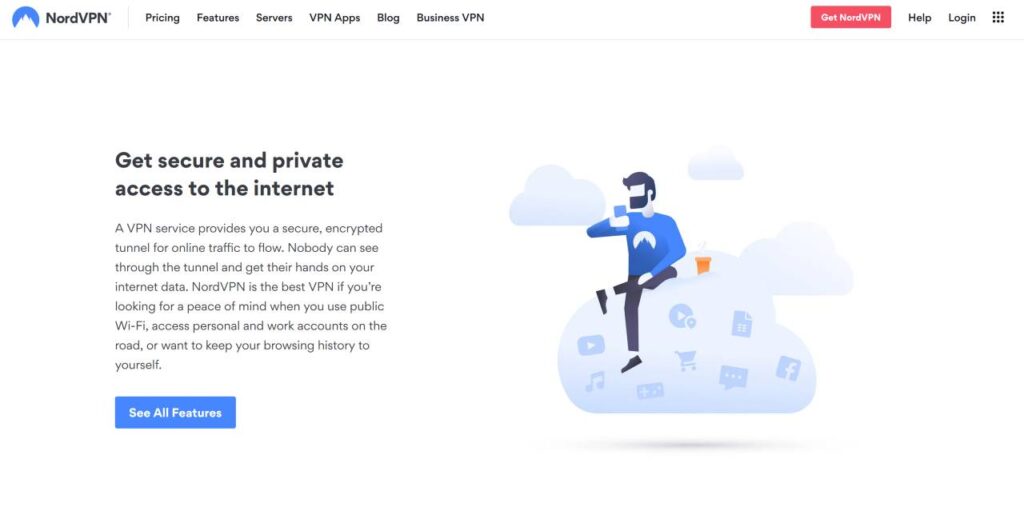
If you’ve ever decide to check a VPN, you’ve almost definitely come across NordVPN. This is owing to their dynamic marketing strategy.
However, does good marketing always suggest good service?
The VPN market trends are evolving every day, thanks to tighter geoblocks, increased scrutiny of VPN use, and new, advanced features from other VPNs.
You may have found that using VPN services results in a sluggish network connection. If this fits you, NordVPN is a must-have.
You can choose from over 5300 NordVPN servers in 55 countries, allowing you to have the fastest VPN experience possible.
Hundreds and hundreds of VPN servers ensure that your internet connection remains untouched.
The NordVPN smartphone and desktop applications are easy to install and use. Before you really link to a server, you must complete just three steps, so the entire installation process should take no longer than 5 minutes.
The fact that this VPN works flawlessly in China and can easily bypass the Chinese Great Firewall is a big plus.
NordVPN provides three subscription plans: $11.95 a month, $59.00 every year, or $89.00 every two years. PayPal, various anonymous cryptocurrencies, Credit cards, and other online payment methods are all authorized.
VPN providers sometimes run promotions, so if you go to check up, you may see a different amount.
In terms of your privacy, NordVPN is headquartered in Panama and operates there (the company also has offices elsewhere), where there are no rules requiring the company to maintain data for any period of time.
If it is subpoenaed, the company argues it can only react to a court order or subpoena given by a Panamanian court.
According to NordVPN’s privacy policy, link time stamps, session information, used bandwidth, traffic logs, IP addresses, and browsing data are not recorded.
Alternatively, NordVPN saves your last session’s username and time, but that’s only for fifteen minutes after you detach from the VPN. That is indeed excellent.
There’s also no trial with NordVPN, but they really do give a 30-day money-back guarantee without any questions asked, which serves as a trial for you.
You will be forced to enter your credit card details, so if you are dissatisfied with the service, cancel it to avoid being charged at the end of your subscription period.
The pricing plans at NordVPN are:
- Monthly: $11.95 a month ($143.4 per year)
- 2-Years: 4.92/month ($59.04 a year)
- 2-Years: $3.71 / month ($44.52 annually)
You can protect up to 6 devices with a single contract, together with smart TV and router.
3. Surfshark
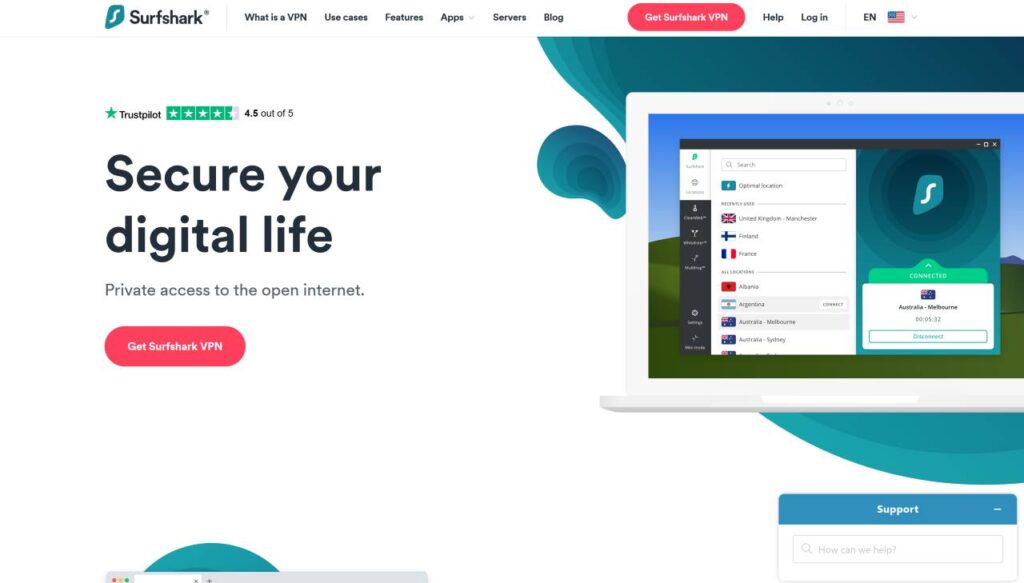
Despite the fact that the VPN market is still evolving and competitive, Surfshark has managed to create a unique identity for itself.
At over 3200 servers in over 60 countries, this VPN service has continued to take out a few of the industry’s biggest players and has begun to position itself as the next industry leader in terms to VPNs.
Another key selling point for this VPN provider is that it allows you to use it on different platforms.
This implies you only need one subscription to protect all of your devices, which is suitable if you’re planning to travel with friends or family.
Surfshark also comes with a 30-day money-back guarantee, so you can check it out risk-free for a month and see if it suits your needs.
Surfshark also is renowned for its high privacy features like Camouflage Mode.
When you activate this function, no one, including your ISP, will be able to see that you’re using a VPN, which is particularly important if you’re in China.
4. Private Internet Access
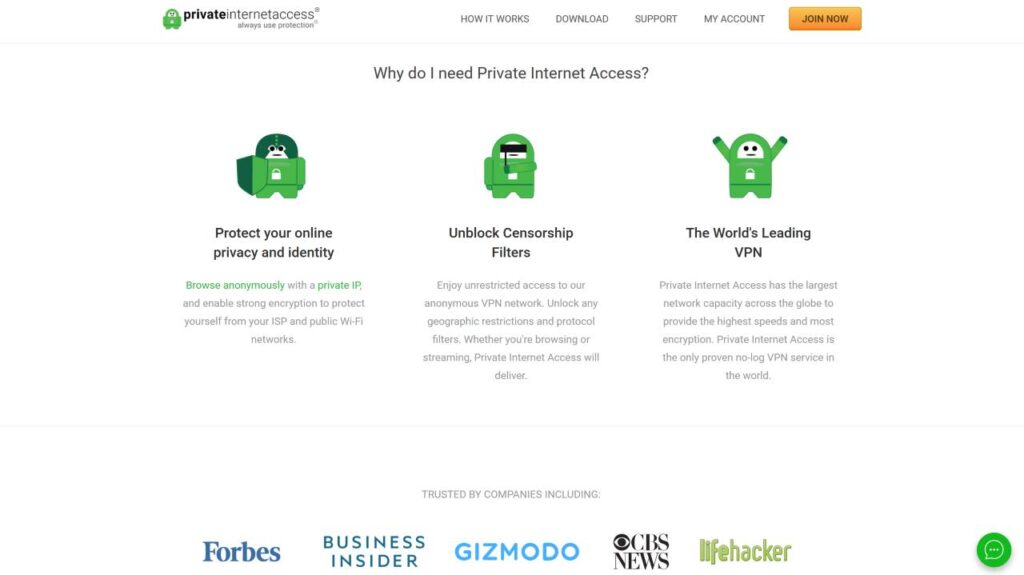
One feature you can’t deny Private Internet Access (PIA) is their vast server network.
Private Internet Access (PIA) is by far doubt the largest VPN provider in terms of the number of servers, with over 29247 servers distributed across 75 countries.
Customer support is one of PIA’s main strengths in keeping up to most of its biggest rivals.
PIA now offers the 24/7 live chat service that we’ve already seen from the best VPNs.
The following are some of the advantages of using Private Internet Access:
- Dedicated VPN Service
- Unmetered VPN Transfer
- No Traffic or Request logs
- VPN service specialists
- US based corporation
- Quality and reliability
- Unbeatable price
- Gigabit VPN port speeds
- DD-WRT VPN Compatible
- Professional support staff
- SOCKS5 Proxy Included
- OpenVPN Premium
- VPN Bandwidth
- Anonymous VPN
- Instant activation
PIA VPN is available for multiple platforms and is perfect for groups and families, as it allows you to link up to 10 devices at once.
They also have a receptive live chat service and articles in their knowledge base for tutorials, FAQs, and guides.
5. PrivateVPN
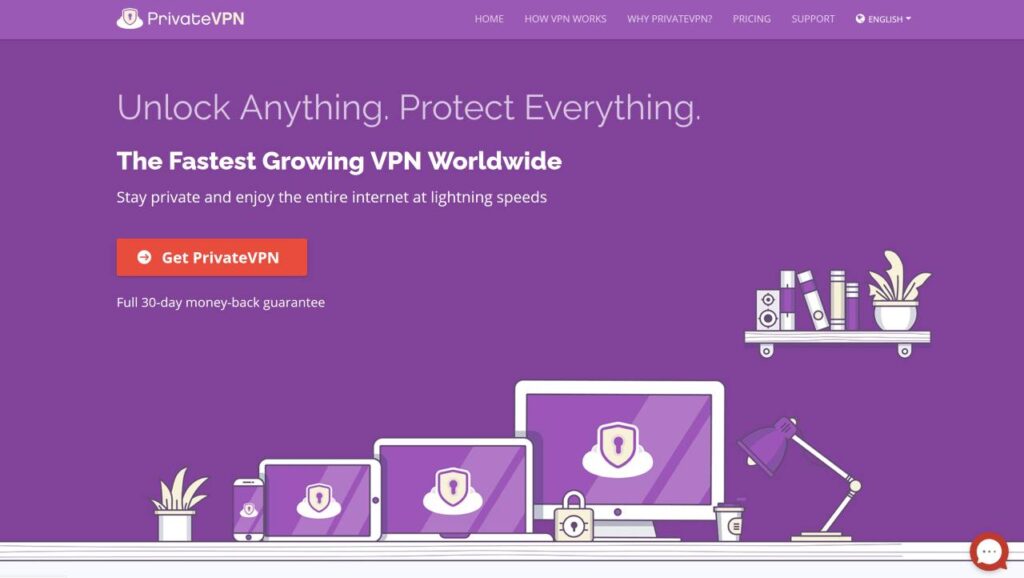
PrivateVPN is among the most well-known VPN service providers, providing excellent protection and fast connections to users around the world.
It’s not as large as some of its rivals, however that doesn’t make it any less dependable.
Even if there are only about 150 servers, many of them seem to be in close proximity to China, such as Hong Kong and Japan, which is critical for communication speed.
PrivateVPN also provides unlimited server swaps, allowing you to toggle across them whenever you want.
Stealth mode obfuscates your VPN traffic, enabling you to circumvent the Great Firewall and visit foreign websites without being identified. Even your ISP won’t be conscious that you’re using a VPN.
A strict absolutely zero logs policy is also in effect to keep the web activity secret.
PrivateVPN allows users to connect up to six devices simultaneously. Since there isn’t many servers in the network, you can reach customer service before going to China to find out which ones work best.
You won’t have any trouble contacting PrivateVPN because it provides live chat support 24 hours a day, 7 days a week.
There’s even a 30-day money-back guarantee, so you can test out PrivateVPN without committing to something long-term.
What to Do Before Travelling to China
If you plan to visit China anytime soon and you are concerned about being able to access any of Google’s property, especially Gmail.
The following action points should be strictly adhered to, if you don’t want to encounter any challenge accessing Gmail in China.
a. Be Armed Before Entering China
You have to be reliably sure if the particular websites that you regularly use can go through the Great Firewall of China.
This can be done by asking friends or relatives inside of China already to help access the websites and confirm if it’s going through.
If you cannot get friends to do this for you, then you can visit this website and enter the domain name (URL) of the website.
The website will reveal to you if it can be assessed or not.
Do however know that the security behind the Chinese Great Firewall does changes often. So a site that is available today may not be available the next minute.
Sign up to a VPN Provider
This is one of the surest ways to about it. Don’t just try to guess your way out of it all by thinking that your favourite website will be available inside of China.
Our best picks here at VPNJedi are ExpressVPN and NordVPN. With any of these two VPNs, you are good to go.
b. Ensure That Your VPN Works Inside China
While most VPN providers tend to offer you the guarantee that their VPN works inside China and can bypass China’s Great Firewall, it pertinent to know that this is not always the case.
One of the major reasons for this is that there is always tight security behind the Great Firewall of China, in addition to its constant upgrades.
So, you should try to ask any VPN service that you intend to go with if their VPN has the ability to go through the Great Firewall of China.
c. Download, Install and Configure Your VPN Software Before Stepping Into China
This is the last step you are to take.
Just go with any of our recommended choice, which is either ExpressVPN or NordVPN.
Download, install and configure the VPN of your choice before stepping your foot in China.
If you try to do this while in China already, you will be faced with a lot of resistance, which you may not be able to overcome easily.
Final Verdict on Accessing Gmail in China
As you can see, it is highly possible to effectively use Gmail right inside China.
What you actually need is the right information and you should be able to access Gmail in China.
This can be done without any hassles using either ExpressVPN or NordVPN, which are our top picks for this purpose.
All that is required from you is to go with any of our recommended VPN providers and ensure that you have it installed and configured both on your mobile device or computer before you ever think of traveling to China.
To this end, we all at VPNJedi will be looking forward to hearing your success stories when it comes to being able to bypass and break through the Great Firewall of China and having access to Gmail in China.
